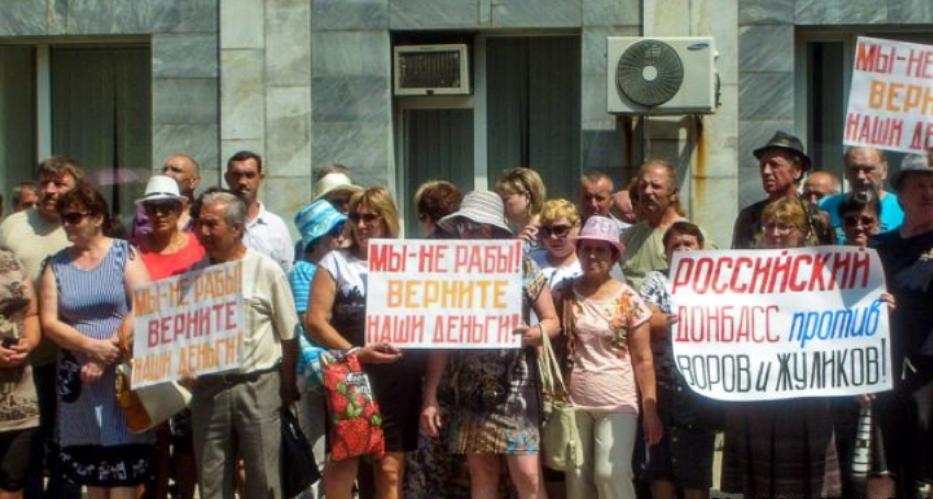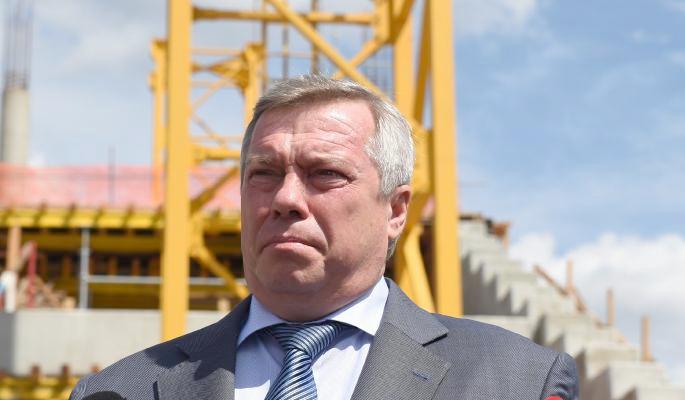
Miners’ demonstration in Gukovo. Handbills: “We are not slaves. Pay us our money” and “Russian Donbas is against thieves and crooks!”
According to the recent report of the Public Opinion Foundation, 75% of Russians are dissatisfied with their salaries, and 40% are no longer able to hang on to payday. The result of this is the increase of social protests.
The number of protests in Russia are increasing during this third year since the start of the economic crisis. In most cases, they have local character and are caused by specific shortcomings in some organizations, such as the fish processing plant, where workers were not paid wages for a long time, or on the construction of the cosmodrome “Eastern”, were workers went on strike due to delay of payments of their salaries. Other known protest lately include the truck drivers who were opposed to additional charges.
Just for the three first months of 2016, 132 various demonstrations and strikes have been held in 57 Russian regions. It is twice for the entire first half of the previous year.
Especially effected were Samara, Sverdlovsk, Chelyabinsk and Kirov regions. Following were Perm, Trans-Baikal and Primorsky Krai. Those are the very areas where the federal government is looking for settlement of the central regions, offering every new permanent settler a hectare of land.
The summer months brought some new accounts of social protest.
On August 23, more than 100 miners began a hunger strike in the city of Gukovo in Rostov region. Gukovo is located on the Ukrainian border near the territory ruled by the rebellious separatists. It is the Russian part of Donbas, one of the biggest coal mining areas of the former Soviet Union. The locals know very well that Russian government spends billions of rubles to help the neighboring miners on the Ukrainian side of the border. So locals take government’s neglect of their problems especially painfully.
There were times when four thousand miners worked in four mines of Gukovo. Several years ago the mines were bought by a company called “King Coal” (the reference to Upton Sinclair’s 1917 novel.) Then the General Manager of the company Vladimir Pozhidaev disappeared. Now all mines are completely flooded, equipment that cost billions of rubles is lost. Miners believe that several months ago it was still possible to buy new pumps and save the mines for only a couple of million rubles. But now, it’s too late. It would be cheaper to dig new mines than to dry old ones.
According to the Prosecutors’ the General Manager had misappropriated billions of rubles: that of the company and government subsidies. 10% of the company shares belonged to Pozhidaev, 90% to some obscure offshore company. No one knows who is hiding behind it, but given the fact that the Governor of the Rostov region for the long time passively watched the events, many Gukovo’s residents believe that someone in the regional government profited from this scheme. However, no one can prove it.
Only one thing is certain: the money had disappeared, the suspects have disappeared and the prosecutor’s office said to the miners that they should be patient and wait until after the bankruptcy proceedings. Fifty-two charges of financial violations were made against King Coal during the years 2015-2016 and the court has recorded nearly 3,500 lawsuits and claims against the company.
After spending six weeks completely without pay, 120 miners began a hunger strike, demanding to be paid100% wage arrears (more than 300 million rubles) for almost half a year to 2200 miners. After the start of the hunger strike the Governor of the Rostov Region, Vasily Golubev, met the protesters and personally resolved the problem. The arrears were paid to the miners.
It’s interesting to note that Vasily Golubev was born in this very area where the events took place. His parents were miners. In his young years he also worked in a mine. Golubev (59) made his career in the Soviet time as a communist party functionary. Prior to becoming the Governor of the Rostov Region in 2010, he was a Deputy Governor of the Moscow Region. He is a doctor of economics.
Another act of protest that got the attention of Russians last week was the beginning of a “Tractor run” of Kuban (a southern region of Russia) farmers to Moscow. Kuban is one of the most important agricultural regions of the country. It also became known in the last years as the especially lawless region with criminal structures closely connected to the police and other law enforcement structures. The farmers planned to appeal to the President with a request to look into the problem of unjust court decisions against them. Fifty people with 17 tractors and 8 cars started their run from the village of Kazanskaya toward Moscow. The organizers hoped that about 300 tractors from other regions would join them on their way.
When the column reached Rostov-on-Don, the biggest city of the region, the police have blocked off protesters in the Rostov Hotel where they had stopped to rest during their long journey.
Vladimir Ustinov, the Deputy Representative of the President of Russia in the Southern Federal District came to speak with the protesters. No details of the meeting were specified in the official coverage of the event. Nevertheless the protesters returned to Kuban.
All these protests had no aggressive character. Protesters only wanted to apply personally to President Vladimir Putin, believing that he is the only person capable and willing to help every Russian in need.
It looks like Putin doesn’t rely on the assamption that the peaceful character of the protests will stay forever.
This April, by the decision of the President Putin, there was created the National Guard of Russia, exceeding 340,000 people, personally subordinate to the President. Formation of the Guard should be fully completed by 2018. Before the end of this year the transfer to the Guard of all military regiments of the Ministry of Interior Affairs, special purpose regiments of army and air forces, and private security organizations will be completed.
The wages of the National Guard employees are planned to be twice the wages of employees of today’s regiments of the Ministry of Interior Affairs.
It was reported not long ago that Ministry of Interior Affairs has purchased hidden video equipment to monitor the mass demonstrations.



The US is no more happier with our wages and the 1% taking all the money.
We ARE the 1%… https://i.ytimg.com/vi/Er1kTF3smOE/hqdefault.jpg
We never did win the Cold War… it’s gotten worse after the breakup of the Soviet Union.
Still thinking this sounds more like today’s America.